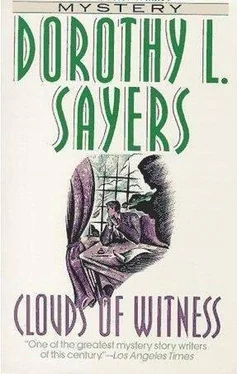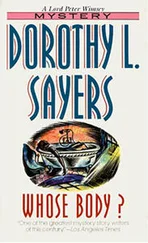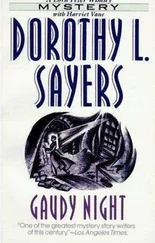The driver of a taxi spinning across the bridge saw the fierce face just ahead of his bonnet, and jammed on the brakes, as the madman's fingers closed for the last time on the trigger. Shot and tyre exploded almost simultaneously; the taxi slewed giddily over to the right, scooping the fugitive with it, and crashed horribly into a tram standing vacant on the Embankment dead-end.
"I couldn't 'elp it," yelled the taxi-man, "'e fired at me. Ow, Gawd, I couldn't 'elp it."
Lord Peter and Parker arrived together, panting.
"Here, constable," gasped his lordship; "I know this man. He has an unfortunate grudge against my brother. In connection with a poaching matter-up in Yorkshire. Tell the coroner to come to me for information."
"Very good, my lord."
"Don't photograph that," said Lord Peter to the man with the reflex, whom he suddenly found at his elbow.
The photographer shook his head.
"They wouldn't like to see that, my lord. Only the scene of the crash and the ambulance-men. Bright, newsy pictures, you know. Nothing gruesome"-with an explanatory jerk of the head at the great dark splotches in the roadway-"it doesn't pay."
A red-haired reporter appeared from nowhere with a notebook.
"Here," said his lordship, "do you want the story? I'll give it you now."
There was not, after all, the slightest trouble in the matter of Mrs. Grimethorpe. Seldom, perhaps, has a ducal escapade resolved itself with so little embarrassment.
His grace, indeed, who was nothing if not a gentleman, braced himself gallantly for a regretful and sentimental interview. In all his rather stupid affairs he had never run away from a scene, or countered a storm of sobs with that maddening "Well, I'd better be going now" which has led to so many despairs and occasionally to cold shot. But, on this occasion, the whole business fell flat. The lady was not interested.
"I am free now," she said. "I am going back to my own people in Cornwall. I do not want anything, now that he is dead." The Duke's dutiful caress was a most uninteresting failure.
Lord Peter saw her home to a respectable little hotel in Bloomsbury. She liked the taxi, and the large, glittering shops, and the sky-signs. They stopped at Piccadilly Circus to see the Bonzo dog smoke his gasper and the Nestlé's baby consume his bottle of milk. She was amazed to find that the prices of the things in Swan & Edgar's window were, if anything, more reasonable than those current in Stapley.
"I should like one of those blue scarves," she said, "but I'm thinking 'twould not be fitting, and me a widow."
"You could buy it now, and wear it later on," suggested his lordship, "in Cornwall, you know."
"Yes." She glanced at her brown stuff gown. "Could I buy my blacks here? I shall have to get some for the funeral. Just a dress and a hat-and a coat, maybe."
"I should think it would be a very good idea."
"Now?"
"Why not?"
"I have money," she said; "I took it from his desk. It's mine now, I suppose. Not that I'd wish to be beholden to him. But I don't look at it that way."
"I shouldn't think twice about it, if I were you," said Lord Peter.
She walked before him into the shop-her own woman at last.
In the early hours of the morning Inspector Sugg, who happened to be passing Parliament Square, came upon a taxi-man apparently addressing a heated expostulation to the statue of Lord Palmerston. Indignant at this senseless proceeding, Mr. Sugg advanced, and then observed that the statesman was sharing his pedestal with a gentleman in evening dress, who clung precariously with one hand, while with the other he held an empty champagne-bottle to his eye, and surveyed the surrounding streets.
"Hi," said the policeman, "what are you doing there? Come off of it!"
"Hullo!" said the gentleman, losing his balance quite suddenly, and coming down in a jumbled manner. "Have you seen my friend? Very odd thing-damned odd. 'Spec you know where find him, what? When in doubt-tasker pleeshman, what? Friend of mine. Very dignified sort of man 'nopera-hat. Freddy good of Freddy. Alwaysh answersh t'name-jush like jolly ol' bloodhound!" He got to his feet and stood beaming on the officer.
"Why, if it ain't his lordship," said Inspector Sugg, who had met Lord Peter in other circumstances. "Better be gettin' home, my lord. Night air's chilly-like, ain't it? You'll catch a cold or summat o' that. Here's your taxi-just you jump in now."
"No," said Lord Peter. "No. Couldn' do that. Not without frien'. Good of' Freddy. Never-desert-friend! Dear ol' Sugg. Wouldn't desert Freddy."
He attempted an attitude, with one foot poised on the step of the taxi, but, miscalculating his distance, stepped heavily into the gutter, thus entering the vehicle unexpectedly, head first.
Mr. Sugg tried to tuck his legs in and shut him up, but his lordship thwarted this movement with unlooked-for agility, and sat firmly on the step.
"Not my taxi," he explained solemnly. "Freddy's taxi. Not right-run away with frien's taxi. Very odd. Jush went roun' corner to fesh Fred'sh taxshi-Freddy jush went roun' corner fesh my taxi-fesh friend'sh taxshi-friendship sush a beautiful thing-don't you thing so, Shugg? Can't leave frien'. Beshides-there'sh dear ol' Parker."
"Mr. Parker?" said the Inspector apprehensively. "Where?"
"Hush," said his lordship. "Don' wake baby, theresh good shoul. Neshle'sh baby-jush shee 'm neshle, don't he neshle nishely?"
Following his lordship's gaze, the horrified Sugg observed his official superior cosily tucked up on the far side of Palmerston and smiling a happy smile in his sleep. With an exclamation of alarm he bent over and shook the sleeper.
"Unkind!" cried Lord Peter in a deep, reproachful tone. "Dishturb poor fellow-poor hard-workin' pleeshman. Never getsh up till alarm goes… 'Stra'or'nary thing," he added, as though struck by a new idea, "why hashn't alarm gone off, Shugg?" He pointed a wavering finger at Big Ben. "They've for-forgotten to wind it up. Dishgrayshful. I'll write to The T-T-Timesh about it."
Mr. Sugg wasted no words, but picked up the slumbering Parker and hoisted him into the taxi.
"Never-never-deshert-" began Lord Peter resisting all efforts to dislodge him from the step, when a second taxi, advancing from Whitehall, drew up, with the Hon. Freddy Arbuthnot cheering loudly at the window.
"Look who's here!" cried the Hon. Freddy. "Jolly jolly, jolly ol' Sugg. Let'sh all go home together."
"That'sh my taxshi," interposed his lordship, with dignity, staggering across to it. The two whirled together for a moment; then the Hon. Freddy was flung into Sugg's arms, while his lordship, with a satisfied air, cried "Home!" to the new taxi-man, and instantly fell asleep in a corner of the vehicle.
Mr. Sugg scratched his head, gave Lord Peter's address, and watched the cab drive off. Then, supporting the Hon. Freddy on his ample bosom, he directed the other man to convey Mr. Parker to 100 Great Ormond Street.
"Take me home," cried the Hon. Freddy, bursting into tears, "they've all gone and left me!"
"You leave it to me, sir," said the Inspector. He glanced over his shoulder at St. Stephen's, whence a group of Commons were just issuing from an all-night sitting.
"Mr. Parker an' all," said Inspector Sugg, adding devoutly, "Thank Gawd there weren't no witnesses."

British author Dorothy L. Sayers (1893-1957) is widely recognized as a master of the detective story genre. Her fourteen novels that feature aristocrat, scholar, and sleuth Lord Peter Wimsey were well received in their first publication, and have become bestselling classics.
Читать дальше
Конец ознакомительного отрывка
Купить книгу













